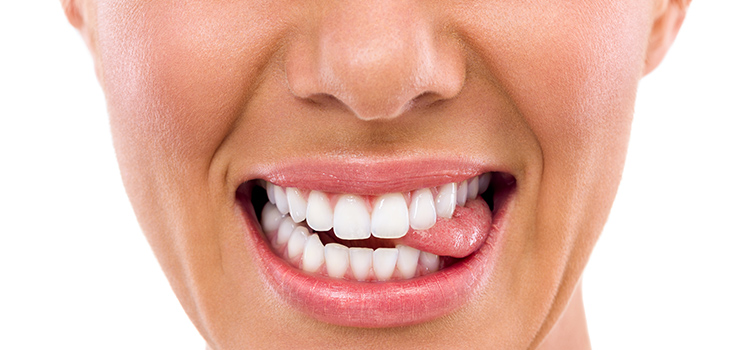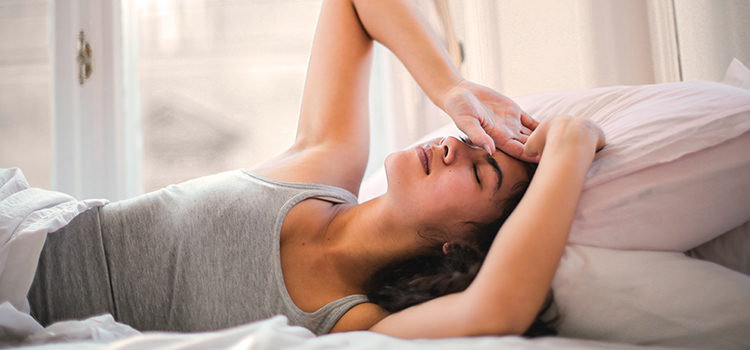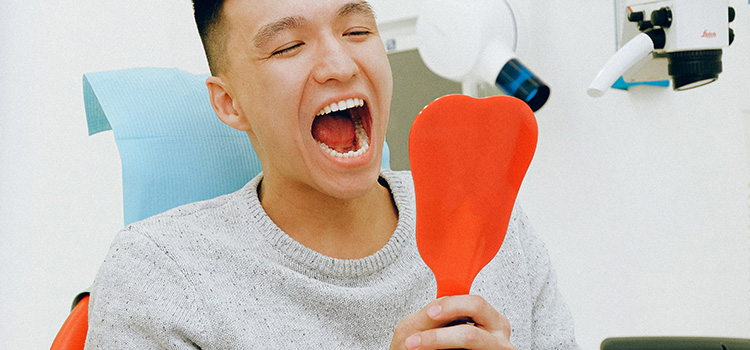Sleep should be a time for our brains and bodies to rest and rejuvenate, so it can be frustrating to wake up with pain or discomfort caused from biting tongue in sleep. If you’re frequently waking up with oral pain, you could be biting your tongue in your sleep. This is not only irritating but the repeated action can lead to ulcers, tongue scalloping, oral infections, and soreness. Here are the causes, treatment and prevention strategies of tongue biting so that you can get yourself a good night’s rest.

Symptoms of Tongue Biting in Sleep
Some people may be completely unaware that they bite their tongue because it occurs when they sleep. Healthline explains that there are many symptoms of tongue biting. If you suffer from the following symptoms you may be unknowingly biting your tongue in your sleep:
- tongue bleeding
- redness or swelling of the tongue
- pain
- cuts or marks on the tongue
- ulcer on the tongue
- raw, scalloped edges on the tongue
Why do I Bite my Tongue When I Sleep?
Tongue biting can be a symptom of many different conditions, some more serious than others. In order to understand the best way to prevent biting tongue in sleep, it’s helpful to know what is causing it. Additionally, nighttime tongue biting may be a sign of a more serious underlying health condition. Some common causes of tongue biting are the following:
NOCTURNAL SEIZURES
Seizures are uncontrollable bursts of electrical activity between brain cells which cause muscle spasms and stiffness. Nighttime seizures may be an indicator of epilepsy. Because those who suffer from epileptic seizures lose control of their behaviors and movements, people tend to bite their tongue unconsciously. Healthline explains that “bites occur on the tip and sides of the tongue”. This can result in serious tongue injuries as well as pain to the temporomandibular joint. Additionally, while it’s not a direct cause of tongue biting, sleep apnea has been connected to the habit.

BRUXISM
Bruxism refers to when a person involuntarily grinds or clenches their teeth, often in their sleep. This gnashing habit can cause bruxers to bite or scrape their tongue. Frequent teeth grinding or clenching can lead to intense pain or a swollen tongue, lip, or cheek in the morning and throughout the day. Additionally, a possible side effect of sleep bruxism is a scalloped tongue. This condition is characterized by indentations on the sides and tip of the tongue.
MISALIGNED BITE
A misaligned bite, or malocclusion, can cause bruxism as well as tongue biting while sleeping. Malocclusion can also restrict the movement of the tongue and force it to sit unnaturally in the mouth, making tongue biting more common. Additionally, improper alignment of the upper and lower teeth can cause other painful symptoms so if you suspect you have a misaligned bite, you should visit your dentist for a dental exam.
SLEEP RHYTHMIC MOVEMENT DISORDER
Sleep Rhythmic Movement Disorder causes sufferers to experience sudden jerking movements or twitching while they sleep, usually in their head and neck. The disorder is most common in children and can involve body rocking, head banging, and head rolling which leads to injuries in the eyes, brain and tongue. Fortunately, the prevalence of this sleep disorder decreases with age. The American Academy of Sleep Medicine states, “At 18 months of age, the overall rate drops to 33%. It commonly goes away by two or three years of age. By five years of age, the rate is only 5%” (2021).
DRUG USE
The use of recreational drugs such as MDMA and other stimulants can lead to excessive grinding of the teeth and biting of the tongue. These types of drugs speed up activity in your central nervous system, causing an adrenaline rush. Your body reacts to this excess of adrenaline by grinding the teeth, clenching the jaw, and biting the tongue and cheeks. Because the drugs act as a low-level anesthetic, you often don’t realize the damage you’re inflicting on your oral health.

How to Stop Biting Tongue in Sleep?
There are many ways to prevent tongue-biting. Treatment will vary based on the underlying cause. A bitten tongue can be painful, and frustrating if you do not know the cause. Try some of the following remedies to prevent or avoid tongue-biting.
A SLEEP STUDY
If you suspect you’re experiencing seizures in your sleep or are concerned you have a seizure disorder, consider seeing a neurologist. They can conduct a sleep study for you and determine what is happening in your brain while you are asleep. A sleep study usually consists of EEG machines which monitor your brainwave activity in the different stages of sleep. This can reveal many possible triggers for your tongue biting habits, which makes it easier to treat the habit. The Sleep Foundation recommends participating in a sleep study to help diagnose many different sleep disorders.
NIGHTGUARDS AND SPLINTS
Regardless of the reason you bite your tongue, a mouth guard is an effective preventative tool. Particularly if you suffer from bruxism, a nighttime mouth guard will help to protect your tongue (and teeth) from any further damage. The most effective way to prevent teeth grinding, clenching or biting of the tongue is to purchase a custom-fitted mouthguard for tongue biting. These guards are molded to fit your teeth and mouth and restrict movement in the mouth so you’re unable to brux in a way that could potentially hurt your tongue.
REDUCE STRESS
Literature consistently confirms that “anxiety and depression [are] antecedents of Bruxism” (2011). Bruxism and rhythmic movement disorder, in some cases, is associated with high levels of stress and anxiety. Finding stress-management techniques and cognitive behavioural therapy can help to prevent sleep disorders such as these. Some bruxers have found success through yoga, meditation, and other relaxation techniques.
Related Articles:
How Can I Treat a Bitten Tongue?
Fortunately, there are many treatment options for a bitten tongue. How you treat the problem may vary based on the reason you bite your tongue. Further treatment may be necessary for more severe underlying causes such as epilepsy.
APPLY ICE TO THE AFFECTED AREA
If your tongue endures injuries from biting such as swelling, cuts, or redness, ice can help to treat the affected area. Treating the area with ice or a cold compress will numb the tongue and reduce the pain, as well as help to reduce swelling and inflammation.
RINSE YOUR MOUTH WITH SALTY WATER
If there is an open wound, it’s a good idea to rinse your mouth with warm, salty water for around twenty seconds. Repeat if necessary. This kills bacteria, prevents infection and speeds up the healing process.
AVOID SPICY AND HOT FOODS
Eating spicy or hot foods, particularly if you have an open or fresh wound, will aggravate your pain. These kinds of foods can also increase inflammation of the tongue, making it more likely that you bite your tongue repeatedly. Try to eat soft mild foods that don’t require much chewing until your tongue heals.
SEE A DOCTOR
If you suspect you’ve done serious damage to your tongue or your pain is severe, visit a medical professional. They can assess the state of your mouth and possibly identify the underlying cause of your tongue biting. This can assist in choosing the best treatment plan. Additionally, if you suspect your tongue pain may be caused by a more serious underlying health condition such as TMJ, visit a healthcare professional.
TONGUE BITING IN YOUR SLEEP
An injured tongue might consist of swelling, redness, and cuts. Most people have felt the discomfort of accidentally biting their tongue while eating. However, repeated tongue biting in your sleep may be a result of underlying conditions such as epilepsy, bruxism, or rhythmic movement disorder. Fortunately, there are many effective treatment options such as cold compresses, night guards, etc. Prioritizing your dental health will help you avoid future damage such as jaw muscle pain, broken teeth, etc.
For quality custom-fitted mouth guards, visit Pro Teeth Guard. Our dental appliances are custom made in a dental lab from impressions of your unique teeth and mouth to treat bruxism and related conditions. Your impression kit is sent directly to your door, so you can avoid a trip to the dental office. Pro Teeth Guard offers a 110% money back guarantee.
References:
- Burke, D. (2021). Malocclusion of the Teeth. Healthline. https://www.healthline.com/health/malocclusion-of-teeth#prevention
- Cirino, E. (2019). How to Stop Biting Your Tongue in Your Sleep. Healthline. https://www.healthline.com/health/biting-tongue-in-sleep#prevention
- Mathew, R., & Morse, A. M. (2021). Sleep Rhythmic Movement. American Academy of Sleep Medicine. https://sleepeducation.org/sleep-disorders/sleep-rhythmic-movement/#risk-factors-for-sleep-rhythmic-movement-disorder
- Sutin, A. R., Terracciano, A., Ferrucci, L., & Costa, P. T., Jr (2010). Teeth Grinding: Is Emotional Stability related to Bruxism?. Journal of research in personality, 44(3), 402–405.https://doi.org/10.1016/j.jrp.2010.03.006
- Weiss, S. (2018). This Is Why Molly Makes You Grind Your Teeth. VICE. https://www.vice.com/en/article/d3kz9m/mdma-ecstasy-makes-you-grind-your-teeth
